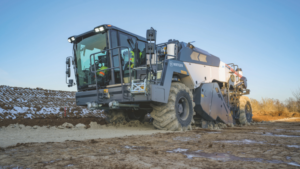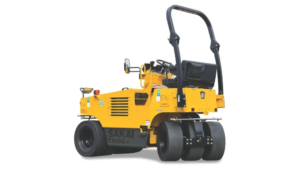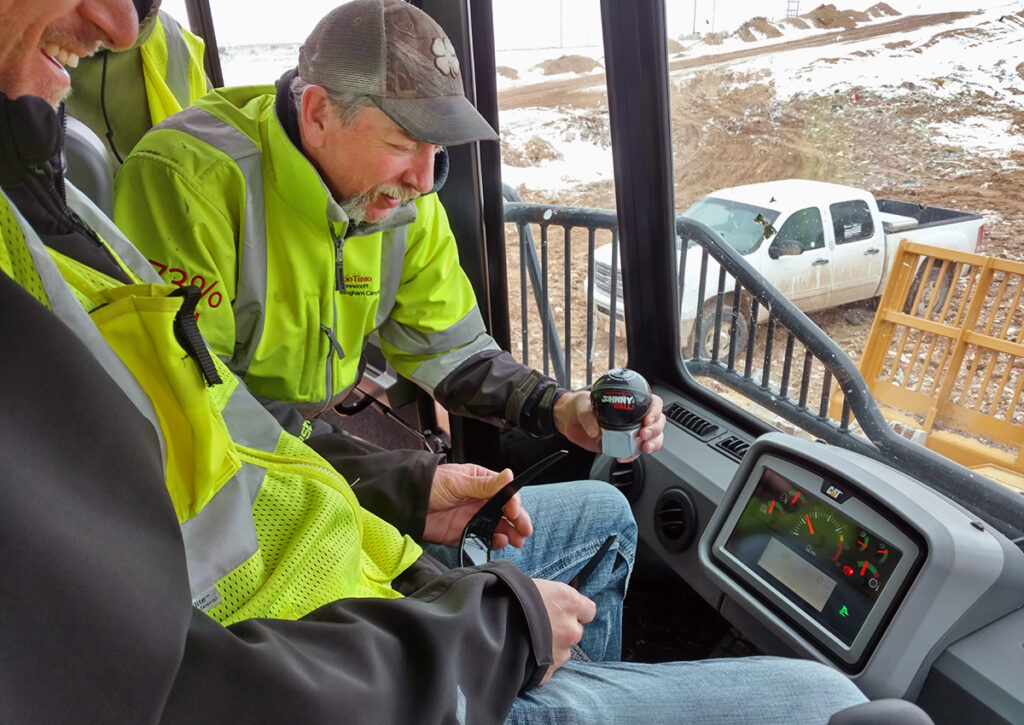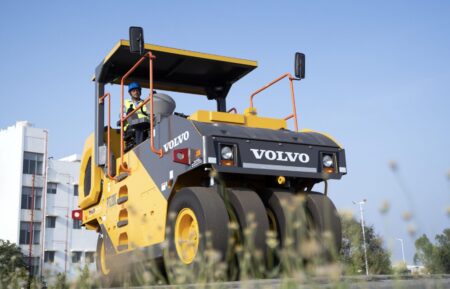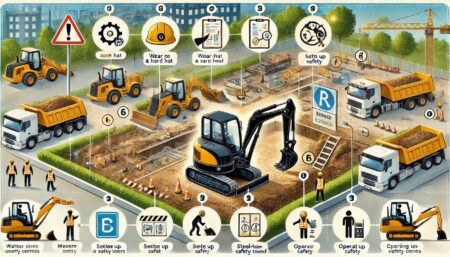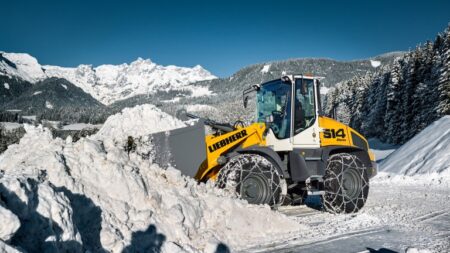By Jeff Winke
Building landfills have become more complex and technologically sophisticated. Gone are the days when a smart owner could manage a site by pushing dirt over collected refuse.
Back then, measurements were close approximations and quality was achieved through the skill and experience of a heavy-equipment operator.
Today, contractors and project owners expect more. Speed, exacting accuracy, productivity and quality long-life results are the expectation. Construction machines are more technologically advanced, and sophisticated software creates project plans, manages the work and documents the results.
“Amidst the expensive, often difficult to learn, advanced technology is a simple, effective tool for building and maintaining landfills,” said John Miller, owner of JCM Excavating and inventor of the JohnnyBall 3D level and slope measuring system.
“The JohnnyBall is mounted inside the operator’s compartment and is designed to allow operators to quickly check if their machine is at true level to then ascertain slope and grade. The mechanical device requires no electronics, batteries or satellites. It uses a compass-like design where the inner ball has industry-standard level and slope indications printed on it and the outer ball carries a stationary dot to indicate the true attitude of the machine, providing a 3D level and slope perspective at a glance.”
Johnnyball accountability
Miller believes the JohnnyBall provides the accountability that can help both the experienced operator perform better and the new machine operator get over the initial “new-kid learning hump” to gain comfortable proficiency and high production.
“Training is crucial for our success as a landfill, since many of our employees come from varying types of backgrounds,” said Jason Turville, operations supervisor at Trans-Jordan Cities Landfill in Utah.
“Our construction process is very specific and so most of our new-hires have to be taught from scratch.”
Most Trans-Jordan machine operators are hired from outside the industry and do not have landfill experience.
Generally, the new employee is mature, between 30 to 50 years old and will have real-world equipment experience from various construction-type companies.
You may also like:
Experience can vary from well-seasoned to some with experience on only one machine type.
Training is a constant at Trans-Jordan, since there are many aspects to learn about processing municipal solid waste (MSW). As some challenges do not happen that often, the company management uses the atypical as a chance to show the less experienced new recruit how to handle it.
For basic training, Trans-Jordan uses some instructional materials produced by the equipment manufacturers, the Solid Waste Association of North America (SWANA), as well as the Utah Safety Counsel.
They conduct classroom training and a lot of hands-on training. Each division of job type has a trainer associated with that skill, which are typically the supervisors who themselves are experienced experts in all aspects of the landfill.
“Training is needed to ensure all our employees are on the same page and doing things consistently the same way. Processing 1,500 tons a day of MSW takes teamwork and coordination,” Turville said.
“In order to keep it safe and productive, training is the key ingredient. Training is also needed to ensure new employees are doing the job as we expect of them rather than some other way they did somewhere else. For example, we compact the trash in a very specific way in order to get the best possible compaction. This process has taken much refinement through the years and is crucial to our success.”
A key to Trans-Jordan’s technical skills field training is the JohnnyBall 3D level and slope measuring system.
“We purchased our first JohnnyBall merely to help aid the operators achieve true machine level, but then we quickly realized how it can help new operators who don’t quite understand or know what different slope angles look and feel like,” Turville said.
“On a daily basis, we expect our working face to be a 4:1, with side slopes of 3:1. The JohnnyBall has been instrumental in teaching this technical requirement that we expect of all our operators. A 4:1 working face is ideal for the best compaction, based on how we run our operation and the JohnnyBall holds them accountable by showing consistent, accurate feedback.”
Turville cited one employee who especially benefited from JohnnyBall training: “We had one guy who was maintaining the tipping face of the active landfill too steep and it was making the job really hard on him. Once we got him comfortable with the JohnnyBall and he realized the correct slope, he was able to use it to learn the correct steepness for the best compaction.”
Pain reduction via Johnnyball
Before Trans-Jordan started using JohnnyBall for training and its daily heavy production, employee field training was “painful,” according to Turville.
It was not only time consuming, but required a second individual watching the employee while they were learning to give constant feedback on the operator’s performance.
“We expect our operators to be comfortable and proficient with all of our equipment,” Turville said. “With a new operator, we start them with running the compactor because that is a core machine to our business. Compactors are ‘the money maker,’ and must be the piece of heavy equipment that can be operated by everyone.”
Newbie integration
After compactor training, Trans-Jordan slowly integrates the newbies into the other machines, which are also equipped with the JohnnyBall 3D level and slope measuring systems.
The philosophy
Their philosophy is that everyone should be skilled on all of the equipment, so they can be rotated through that equipment, keeping them interested and fresh, plus ensuring they always have skilled operators available to get any job done correctly.
“When our operators are working the landfill tipping face and gaining the compaction necessary, they can feel it while operating and verify by glancing down at the JohnnyBall,” Turville said.
“We think that having an expectation and giving the operators the tools to meet that expectation, helps the operator to be successful and improves personal satisfaction. A successful operator shows pride in their work, feels accomplished at the end of the day, and is motivated to continue to improve.”
Read the full article here


